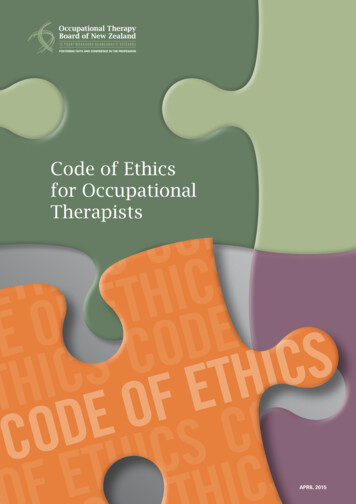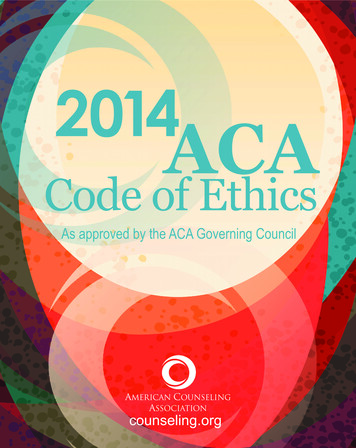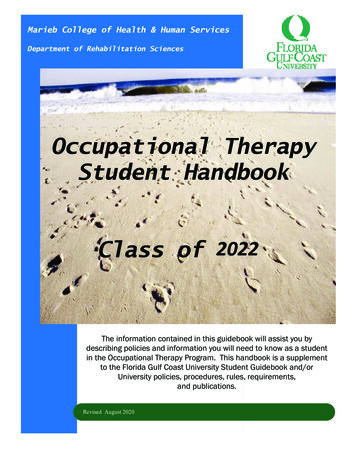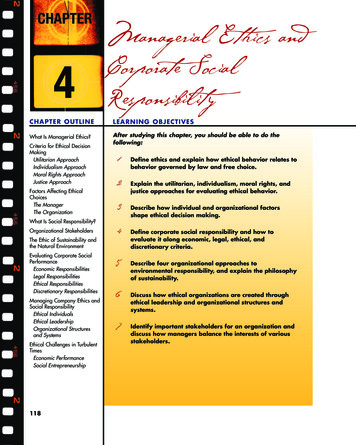
Transcription
Code of Ethicsfor OccupationalTherapistsAPRIL 2015
ContentsIntroduction2Preliminary statement3Principles4Relationship with those receiving occupational therapy services5Relationship with society and potential clients7Relationship with colleagues and the profession8Glossary9Relevant legislation10Reporting obligations11OCCUPATIONAL THERAPY BOARD OF NEW ZEALAND CODE OF ETHICS FOR OCCUPATIONAL THERAPISTS PAGE 1
IntroductionThe Occupational Therapy Board of New ZealandThe Code exemplifies core professional values(the Board) is required as one of the functions setand behaviours underpinning the most commonlyby the Health Practitioners Competence Assuranceencountered ethical considerations in practice,Act 2003 to set standards of ethical conduct to bebut is not intended to address every ethical issue.observed by the profession (Section 118(i)). OtherOccupational therapists are expected to guide andresponsibilities include defining the scope of practicereconcile such issues with a sound process of ethicalof occupational therapists and the minimum expectedreasoning, making careful and considered judgmentsstandards of competence. Overarching all documentsabout the primacy of ethical principles.is a preliminary statement related to the occupationaltherapy practice in Aotearoa New Zealand. Thisstatement should be read before the Code of Ethics(the Code) as it sets the context for the standards ofethical conduct expected of all occupational therapistsregistered to practise in Aotearoa New Zealand. Thepurposes of the Code are:The Code should be read in conjunction with otherrelevant legislation, policies, procedures, and standardsdefining professional practice and conduct, includingthe Board’s Competencies for Registration andContinuing Practice as an Occupational Therapist(October 2014). to inform and protect current and potential clients*of occupational therapy services; and, to protect the integrity of the occupational therapyprofession.*The term ‘client’ refers to any individuals, families, wha‑nau, communities, organisations or populations who mayreceive a service.OCCUPATIONAL THERAPY BOARD OF NEW ZEALAND CODE OF ETHICS FOR OCCUPATIONAL THERAPISTS PAGE 2
Preliminary statementThe role of occupational therapists inAotearoa New ZealandOccupational therapists in Aotearoa New Zealandwork with individuals, families, wha‑nau, communities,Te Tiriti o Waitangi is the founding document ofAotearoa New Zealand. It shapes the diverse historicaland sociopolitical realities of Ma‑ori and all othersettlers and their descendants. Understanding howorganisations, and populations. The role of anTe Tiriti affects all our lives is essential for helpingoccupational therapist is to increase and transformpeople participate in their desired occupation. Suchpeople’s participation in occupation. This helps tounderstanding helps occupational therapists see howpromote and improve wellbeing, health, and socialsystemic and individual issues can breach people’soutcomes. Occupational therapists aim to enhance tinorights and limit their opportunities to participate in theirrangatiratanga (self-determination), ensure equity, andchosen occupations.enable occupational justice.Occupational therapists practice professionally,with a commitment to addressing both individualand systemic barriers to people’s participation inoccupation. These barriers can be cultural, educational,environmental, social, or related to health, disability, orspirituality.OCCUPATIONAL THERAPY BOARD OF NEW ZEALAND CODE OF ETHICS FOR OCCUPATIONAL THERAPISTS PAGE 3
Principles1. RELATIONSHIP WITH THOSE RECEIVINGOCCUPATIONAL THERAPY SERVICESOccupational therapists shall:1.1respect the autonomy of clients receivingtheir service, acknowledging the clients’ rolesin family, whanau and society, and enablingpower and decision-making1.2ensure that people receiving their servicesfeel safe, accepted, and are not threatened byactions or attitudes of the therapist1.3demonstrate that the dignity, privacy, safety,health and concerns of people receiving theirservices are important and respected1.4provide services in a fair and equitable manner2. RELATIONSHIP WITH SOCIETYAND POTENTIAL CLIENTSOccupational therapists shall:2.1accurately represent their skillsand competencies2.2ensure their fee structure is clearly described,communicated, fair, and reasonable3. RELATIONSHIP WITH COLLEAGUESAND THE PROFESSIONOccupational therapists shall:3.1practise within the boundaries of theirexperience, training, and competence3.2support the maintenance of occupationaltherapy standards of practice3.3not bring the profession or other healthpractitioners into disrepute3.4acknowledge and respect other colleagues,professionals and peers.OCCUPATIONAL THERAPY BOARD OF NEW ZEALAND CODE OF ETHICS FOR OCCUPATIONAL THERAPISTS PAGE 4
PRINCIPLES1. Relationship with those receivingoccupational therapy Services1.11.2.4 respect clients’ right of refusal forOccupational therapists shall respect theautonomy of clients receiving their service,services, involvement in research,acknowledging the clients’ roles in family,or educational activities.whanau and society, and enabling power and1.2.5 protect the confidential nature of clientdecision-making.information gained through professionalcontact. Act within the limits prescribed byOccupational therapists shall:the Privacy Act 1993, and in accordance1.1.1 focus their practice on the needswith local policies and procedures.of the client.1.1.2 work with clients to determine their goals1.3Occupational therapists shall demonstrateand priorities, involving family, whanau,that the dignity, privacy, safety, health andand significant others if this is the client’sconcerns of people receiving their serviceschoice. Situations where client choice isare important and respected.overridden, e.g., for reasons of safety,should be clearly documented, including atransparent reasoning process.1.1.3 work in ways that are compatible withclients’ cultures to assist them to achievedesired outcomes.Occupational therapists shall:1.3.1 acknowledge the holistic nature of eachindividual and practise with due care andrespect for diverse culture, needs, valuesand beliefs.1.3.2 ensure clients are able to make informed1.2Occupational therapists shall ensure thatchoices, and give informed consent inpeople receiving their services feel safe,writing before commencement of anyaccepted, and are not threatened by actions,occupational therapy service, or clientomissions or attitudes of the therapist.participation in studies or research.Occupational therapists shall:1.2.1 accurately represent their experience,knowledge, and competence.1.2.2 accept referrals for which they havethe professional skills and resourcesto meet the clients’ needs. The reasonfor non-acceptance of any referral willbe explained.1.2.3 not enter into or continue with anypersonal or professional relationshipswith clients or their carers that will, orExceptions apply where the HDCCode of Health and Disability ServicesConsumers’ Rights Regulation 1996,or where the law provides otherwise.In situations where clients havediminished competence, the occupationaltherapist shall be guided by the HDCCode of Health and Disability ServicesConsumers’ Rights Regulation 1996.1.3.3 base practise on the bestavailable information.1.3.4 accurately record/report client informationhave the potential to, exploit or harm theand interventions to facilitate the care,client and/or others. (Please also refer totreatment and support of clients, relevantGuideline on Professional Boundaries forto the context.Occupational Therapists, 2014).OCCUPATIONAL THERAPY BOARD OF NEW ZEALAND CODE OF ETHICS FOR OCCUPATIONAL THERAPISTS PAGE 5
PRINCIPLES1. Relationship with those receivingoccupational therapy Services (continued)1.3.5 ensure all care is taken to maintainconfidentiality of all records (please alsorefer to Guidelines for Social Media andElectronic Communication, 2014).1.3.6 protect clients by ensuring thatduties assigned or delegated to otheroccupational therapy personnel arecommensurate with their qualifications,training and experience.1.3.7 ensure professional supervisionis provided for other occupationaltherapy personnel (including registeredoccupational therapists occupationaltherapy assistants and students) forwhom they are responsible.1.3.8 receive effective professional supervision.1.4Occupational therapists shall provide servicesin a fair and equitable manner.Occupational therapists shall:1.4.1 use a coherent, robust, and transparentrationale to prioritise the allocationof service.1.4.2 strive for equitable service outcome.1.4.3 advise key personnel (e.g., managers,other service providers, clients and theirfamily, whanau or support people) whenresources are insufficient to allow for safe,adequate, equitable service provision.1.4.4 advocate for occupational justice for clients1.4.5 document unmet needs, and the actionstaken to address these.OCCUPATIONAL THERAPY BOARD OF NEW ZEALAND CODE OF ETHICS FOR OCCUPATIONAL THERAPISTS PAGE 6
PRINCIPLES2. Relationship with society andpotential clients2.1Occupational therapists shall accuratelyrepresent their skills and competencies.Occupational therapists shall:2.1.1 accurately represent their skills andareas of competence to potential clients,including employers, whether thoseservices are to be provided directly orindirectly. An area of competence willbe supported by demonstrable training,knowledge, experience, and skill.2.1.2 only provide services and use techniquesin which they are competent.2.2Occupational therapists shall ensure theirfee structure is clearly described, is fair, andreasonable.Occupational therapists shall:2.2.1 charge fees which are an appropriatereflection of services delivered both toindividuals and organisations with whomthey have contracts for services.OCCUPATIONAL THERAPY BOARD OF NEW ZEALAND CODE OF ETHICS FOR OCCUPATIONAL THERAPISTS PAGE 7
PRINCIPLES3. Relationship with colleaguesand the profession3.13.3.4 refrain from using or participating in theOccupational therapists shall practise withinthe boundaries of their experience, training,use of, any form of communication thatand competence.contains false, fraudulent, deceptive orunfair statements or claims.Occupational therapists shall:3.3.5 if offered tokens such as favours, gifts3.1.1 accurately represent their experience,or hospitality from clients, their familiestraining, and competence to colleagues.or commercial organisations, always3.1.2 identify when clients’ needs fall outsiderespond in a manner commensurate withtheir scope of practice and competence,contextual guidelines. (Please also refer toand take appropriate action. For examplethe Guideline on Professional Boundariesconsult with other persons/access otherfor Occupational Therapists, 2014).resources when additional knowledge3.3.6 identify and report any breach of thisand expertise are required, refer clients toCode of Ethics to the Occupationalother team members/available services.3.2further consideration.Occupational therapists shall supportthe maintenance of occupational therapystandards of practice.3.4Occupational therapists shall acknowledgeand respect other colleagues, professionalsOccupational therapists shall:and peers.3.2.1 be responsible for actively maintainingOccupational therapists shall:and developing their own professionalcompetence.3.2.2 recognise when personal health maycompromise their service to clients, andtake appropriate action.3.3Therapy Board of New Zealand forOccupational therapists shall not bring theprofession or other health practitioners intodisrepute.Occupational therapists shall:3.3.1 uphold and foster the values, integrity, andethics of the profession.3.3.2 take due care, and act with integrity not3.4.1 acknowledge and support other colleagueswhose culture, values, and beliefs, may bedifferent from their own.3.4.2 respect the needs, practices, specialcompetencies, and responsibilities of theirown and other professions, institutions,statutory and voluntary agencies thatconstitute their working environment.3.4.3 use a collaborative approach to practicewhen working within (or referring to) amulti-professional team.3.4.4 ensure continuity of care when referringclients to other parties or organisations.to undermine or defame another healthpractitioner’s professional reputation.3.3.3 disclose any affiliation that may pose aconflict of interest or interfere with goodpractice. In a situation where a conflictof interest is identified, the occupationaltherapist will ensure the conflict issatisfactorily addressed.OCCUPATIONAL THERAPY BOARD OF NEW ZEALAND CODE OF ETHICS FOR OCCUPATIONAL THERAPISTS PAGE 8
Glossarybelief: a principle or idea which is accepted as true or real by aperson, possibly in the absence of proof.client: refers to any individual, family, wha‑nau, community,organisation or population who receive a service.informed consent: consent given by the client after intendedpractices, procedures and possible outcomes are explained andunderstood by them. This must also be obtained to collect andrelease information relevant to the client’s involvement in theservice to others.good practice: practice in which the knowledge, skills, andcompetencies of the therapist are used to support clients in theachievement of their goals.occupational therapist: a person who, having completed arecognised course of training, is registered under the HealthPractitioners Competence Assurance Act 2003.professional supervision: a structured intentional relationshipwithin which a practitioner reflects critically on their work, andreceives feedback and guidance from a supervisor, in order todeliver the best possible service to consumers. Professionalsupervision may incorporate any aspect of professional role e.g.,clinical, managerial, or cultural, and be one to one, or one to group.supervisor: a person who has sufficient self-awareness, interpersonal competence, and knowledge of supervision methodsand processes relevant to the area of practice of the superviseeto facilitate that person’s professional development.OCCUPATIONAL THERAPY BOARD OF NEW ZEALAND CODE OF ETHICS FOR OCCUPATIONAL THERAPISTS PAGE 9
Relevant legislationActs of Parliament and Regulations that directly or indirectly affect theprofessional practice of occupational therapy at present include the: Accident Compensation Act 2001 Children, Young Persons, and Their Families Act 1989 Consumer Guarantees Act 1993 Fair Trading Act 1986 Health and Disability Commissioner Act 1994 Health and Disability Services (Safety) Act 2001 Health and Safety in Employment Act 1992 Health Information Privacy Code 1994 Health Practitioners Competence Assurance Act 2003 Health (Retention of Health Information) Regulations 1996 New Zealand Public Health and Disability Act 2000 Privacy Act 1993 Te Tiriti o Waitangi The Treaty of Waitangi The HDC Code of Health and Disability Services Consumers’ RightsRegulation 1996This Code of Ethics is to be read in conjunction with the following: Competencies for Registration and Continuing Practice as anOccupational Therapist (3rd edition October 2014) Guidelines for Social Media and Electronic Communication Guideline on Professional Boundaries for Occupational Therapists Supervision requirements for Occupational Therapists Relevant national and local standards Local policies and proceduresOCCUPATIONAL THERAPY BOARD OF NEW ZEALAND CODE OF ETHICS FOR OCCUPATIONAL THERAPISTS PAGE 10
Reporting obligationsOccupational Therapist:EmployerCOMPETENCECOMPETENCEIf an occupational therapist has reason to believe thatIf an employee resigns or is dismissed for reasonsanother occupational therapist or health professionalrelated to competence, the employer is required tomay pose a risk of harm to the public by practisingnotify the Board (Section 34(3)).below the required standard of competence, thetherapist may give the registering authority writtenMENTAL AND PHYSICAL FITNESSnotice of the reasons on which that belief is basedIf an employer of an occupational therapist or other(Section 34(1)).health professional has reason to believe that theMENTAL AND PHYSICAL FITNESSoccupational therapist is unable to perform thefunctions required for the practice of his or herIf an occupational therapist has reason to believe thatprofession because of some mental or physicalanother occupational therapist or health practitionercondition, the person must promptly give the Registraris unable to perform the functions required for theof the Board written notice of all the circumstancespractice of his or her profession because of some(Section 45).mental or physical consideration, the person mustpromptly give the Registrar of the responsible authoritywritten notice of all the circumstances (Section 45).Occupational Therapy Schools:The person in charge of the occupational therapyprogramme must promptly notify the Board by wayConvictionsof written notice if they have reason to believe that astudent who is completing a course would be unableCOURTSIt is an applicant’s for registration responsibilityto declare to the Board any convictions recordedagainst their name upon registration (Section 16).to perform the functions required for the practiceof occupational therapy because of some mental ofphysical condition (Section 45(5)).The Registrar of courts must notify the Board if anNOTE: No civil or disciplinary proceedings lie againstoccupational therapist is convicted of an offence whichany person in respect of the above notifications,is punishable by imprisonment of three months orprovided that person has acted in good faith.more (Section 67). It is also an occupational therapist’sprofessional responsibility to notify the Registrar of anyconvictions on an on-going basis.Occupational Therapy Board:If the Board has reason to believe that the practiceof an occupational therapist may pose a risk ofharm to the public, the Board must promptly notifythe Accident Compensation Corporation, theDirector-General of Health, the Health and DisabilityCommissioner, and the employer of the therapist(Section 35).OCCUPATIONAL THERAPY BOARD OF NEW ZEALAND CODE OF ETHICS FOR OCCUPATIONAL THERAPISTS PAGE 11
ANY PERSON WHO IS CONCERNED ABOUT AN OCCUPATIONAL THERAPIST’SPRACTICE SHOULD CONTACT EITHER:THE REGISTRAROTBNZTHE HEALTH AND DISABILITYCOMMISSIONERPO BOX 10-202PO Box 1791The TerraceAuckland 1140Wellington 6143hdc@hdc.org.nzenquiries@otbnz.org.nzTelephone: 0800 11 22 33Telephone: 0800 99 77 55www.otboard.org.nzOCCUPATIONAL THERAPY BOARD OF NEW ZEALAND CODE OF ETHICS FOR OCCUPATIONAL THERAPISTS PAGE 12
3.2.2 recognise when personal health may compromise their service to clients, and take appropriate action. 3.3 Occupational therapists shall not bring the profession or other health practitioners into disrepute. Occupational therapists shall: 3.3.1 uphold and foster the values, integrity, and ethics of the profession.










